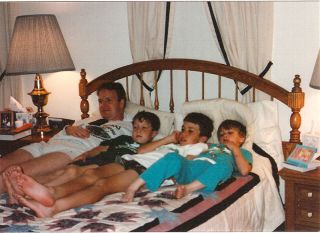Career
The Impact of Retirement on Families
Personal Perspective: A surgeon puts down the scalpel, redux.
Posted April 3, 2024 Reviewed by Ray Parker
Key points
- Retirement may challenge a long-established dynamic with our life partners and children.
- Maintaining interactive, intertwined relationships with our spouses encourages more harmony in retirement.
- Adaptive work behaviors may be maladaptive at home, particularly upon retirement.
- Ongoing engagement with our children is critical to healthy relationships with them as adults.

This post is the second in a series. Read Part 1.
For decades, neurosurgery dominated the majority of my waking days and many, many nights. I stepped away from that world a few years ago. What follows is a continued exploration of what I believe are some universal emotional complexities of retirement and some strategies to deal with them.
Relationship With Our Life Partners
Throughout our careers, we tend to hold onto an antiquated image of our life partners. We see them as the people they were before we submerged into our work universes, perhaps for decades. When we finally emerge, we expect them to persist as that person. We expect to pick up with them right where we left off. The problem is that time hasn’t stopped for them. They have had their own independent careers, challenges, and life experiences. They may have developed vastly different interests, friendships, activities, and causes from us. We and our significant others are now presented with the chilling challenge of determining whether we are still right for each other.

Strategies: Ideally, we and our significant others intertwine throughout our lives, evolving and growing together. This takes intentionality, creativity, and prioritization. We must make time for each other and spend that time wisely. The more we make an effort to get home for meals, to schedule activities with each other, to put down our smartphones, to step away from the TV, to play, to experience, to engage, to talk, to hash things out together, the less we become strangers.
Relationship With Our Children
When we submerge into our careers, our children are indeed children. Or, they may mysteriously appear along the way. But again, we tend to fix them in time. When we retire, though, those beings have disappeared. They no longer exist. They’ve been replaced by different beings. Adult beings. And we can be shocked by the independence of their aspirations, motivations, and mores. What is more, they may pay no heed to our words of advice, direction, or foreboding. This can lead to significant discord and alienation.

Strategies: The time to get to know our children and to come to appreciate their delightful individualism is now, while they are young. The time that we are families experiencing life together as unique units of parents and children is shockingly short. But it can be magical. Again, it would serve us well to put our careers into perspective and find the time to grow with our children through shared activities and experiences. Then to enjoy them as the independent, emancipated individuals they become.
The Home as a Field Hospital
We often use our homes as field hospitals where we expect to be emotionally patched up and sent back into battle by our intensive care nurses—our family members. Our family members may be remarkably tolerant of this, particularly when we constantly throw in their faces the grand importance of our work. But at some point, this gets old. And it gets very old when we still demand all that intensive care unit (ICU) care after our careers have ended.
Strategies: Emotional support and repair are best as a two-way street. Yes, we are often beaten up by our days, but do we think for one minute that our family members are not? All components of life, at all stages, carry enumerable challenges and stressors, large and small. Sharing emotional repair is a healthy mutual growth opportunity. Thus, we should, on occasion, debrief our challenges with our families and solicit theirs. But be aware that we derive no benefit from wallowing in the minutia of said challenges. Rather, we benefit from exploring the roots of their impact on us—why exactly do they stress us—and the consideration of how adaptive our responses to them may or may not be. In the end, it is always good to share far more of our daily uplifts with our loved ones than our stressors.
Compulsive Decision-Making
Many of us hail from decision-intensive careers. There, we are kings of our domain, where problems are presented to us in rapid succession, and we just as rapidly proclaim our sage assessments and solutions. Quite a few of us roll said behavior right into our living rooms. And often, it is not well appreciated. But at least we’re not around much. When we retire, we can become downright annoying, sitting upon our thrones, reflexively dispensing our decrees in response to every home, work, and school challenge facing our families.
Strategies: While we are in our middle years, it serves us well to step out of instant-decision-making mode whenever we are home and listen. Sometimes, we’re being asked simply to be a sympathetic ear—no solutions are requested or desired. In more critical situations, it is well to give our family members credit for having brains of their own and, thus often, very wise analyses of and responses to the problems at hand. Upon retirement, we can take a deep breath and realize that very few things need immediate adjudication. We have time to listen, to think, to put our heads together with our loved ones.
Carrying Other Work Behaviors Home
We are used to decades of high-efficiency functionality in our work. We make things happen. This takes rehearsing and grooving various routines and behaviors. Many of said routines and behaviors, however, do not go over well on the home front. For example, at our dinner table, whenever I ask for the salt and expect the shaker to be slapped into my outstretched hand, I am reminded that those around me are not my scrub techs.
Strategies: We are best at establishing home routines acceptable to our family members while we are still in our middle years rather than allowing annoying work behaviors to become life-long fixed habits. Some behaviors may even be endearing in small doses when we are still working but lose their idiosyncratic attractiveness when we are around all the time. So, we might want to work on a different, more companionable home persona.
References
Lee, G., Shehan, C. (1989) Retirement and Marital Satisfaction Journal of Gerontology, Volume 44, Issue 6, November 1989, Pages S226–S230,
Sherry, A., et al. (2016) Apprehensive about retirement: Women, life transitions, and relationships. Journal of Woman and Aging. Pages 173-184 02 Aug 2016
Johnston, T. (2009) Retirement: What Happens to the Marriage. Issues in Mental Health Nursing
Pages 347-359 09 Jul 2009
Bozoglan, B. (2015) Spousal Intrusion as a Predictor of Wives' Marital Satisfaction in Their Spouses' Retirement. Psychological Reports. 2015 Jun; 116(3):921-35. Volume 116, Issue 3
Simonds,G. Sotile, W. (2018). The Thriving Physician. Huron Consulting Group, LLC; 1st edition. ISBN-10 : 1622181018
Simonds, G., & Sotile, W. (2019). Thriving in Healthcare. Huron Consulting Group LLC. ISBN-10: 1622181085




